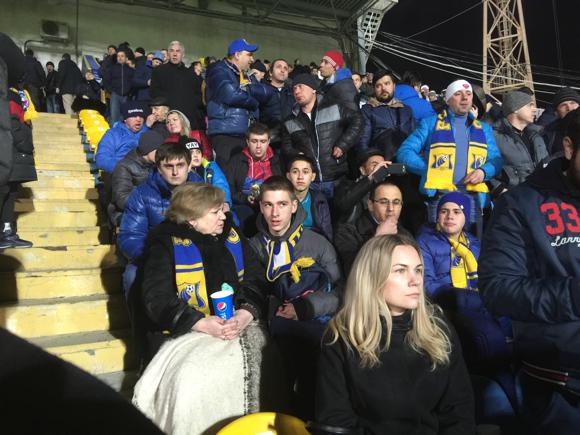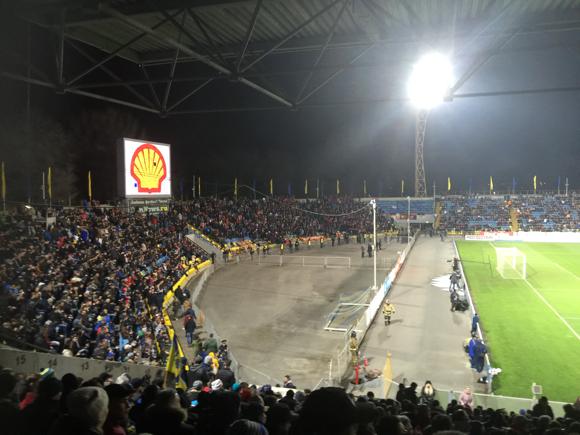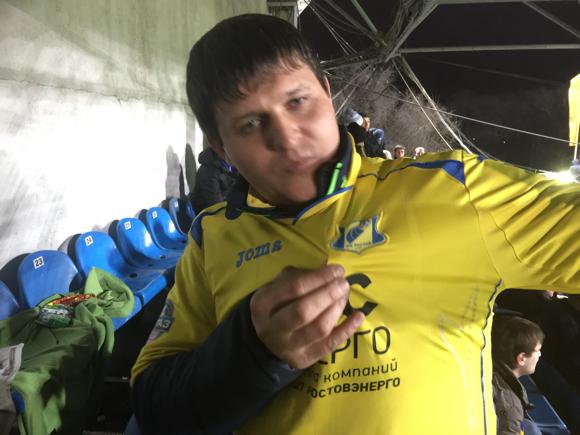Rostov and CSKA Moscow are neck-and-neck for the Russian league title. Victory for the provincial underdogs would be a surprising triumph for maverick coach Kurban Berdyev, who worked similar miracles at Rubin Kazan. Andy Potts asks: Are Rostov the new Nottingham Forest? And is Berdyev Russia’s Brian Clough?
I first encountered Kurban Berdyev, the mastermind behind current league leaders Rostov, the ‘Russian Leicester City’, after the 2010 Russian Super Cup final. His Rubin team had just edged a 1-0 win over CSKA Moscow at a freezing Luzhniki and the maestro emerged into the welcome warmth of the media suite to a polite ovation from the assembled Muscovite hacks.

He proceeded to give the kind of press conference that immediately marked out why he was – and is – one of the game’s great mavericks. Baseball cap pulled low over his brow to block eye contact, fingers feverishly flicking his prayer beads, he mumbled a few complimentary words about CSKA. Questions were pushed away in the same anxious monotone. Far from a victorious football coach, he looked every inch a foreign worker ensnared by a bored cop at a metro station. And there lies the first reason why Berdyev is, in effect, Russia’s Brian Clough.
Hold on. The Brian Clough? The smart-talking, wise-cracking, irrepressible Cloughie? A man who could start an argument in an empty dressing room in between conquering Europe with a rag-tag Dad’s Army of journeymen? Muttering incoherently in front of a room full of expectant journalists?
Let’s back up a minute. We’re talking Russian football here. Head coaches tend to be jovial, clubable ex-pros, primed to fire out bons mots at the slightest provocation. From the irascible Yury Semin at Loko to the oddly quotable evasions of Valeri Karpin at Spartak, there was a game afoot. And Berdyev, like Clough, wasn’t playing it. This guru of Rubin and Rostov was as much an outsider as Cloughie, but while the Derby and Forest supremo earned his renegade status by willingly sticking up two fingers at anyone and everyone, and especially Don Revie, Berdyev frightened the blazers of officialdom due to an accident of geo-politics.

Born in Soviet Turkmenistan, developed as a coach in Central Asia and Turkey, he fell between two stools. Too ‘Russian’ to be embraced in the wave of love for foreign coaches that brought Guus Hiddink, Dick Advocaat and finally, unhappily, Fabio Capello to take charge of the national team. Yet, simultaneously, too ‘foreign’ to appease those who insisted that Russian football needs home-grown coaches, Slavs suckled on the teat of the mysterious Russian soul. And thus, like Clough, the greatest coach his nation never had.
Why so great? Is Berdyev not at least two European Cups short of an invite to polish Clough’s medals? That’s facile thinking, the one-size-fits-all mentality of post-Sky thinking. The key thing about Clough was not that he twice took the champions of England to European glory, it was that he twice took mediocre teams to the pinnacle of the game. At Derby, then at Forest, he applied the skills he learned in the basement at Hartlepools (as they were then known) to transform plodding mid-table into championship glory. Like Leicester. Like Rostov. Like Rubin. Like Berdyev.
When Rubin Kazan appointed their man in 2001 the team had never graced the top league of Russian or Soviet football. Berdyev got them up in 2002, and took third place in the top flight a year later. Shades of George Burley’s Ipswich, but with greater longevity, Rubin stuck it out in the Premier League, gaining enthusiastic local support but failing to convince the metropolitan media of their worth. The club’s 50th anniversary season in 2008 began with a 1-0 win at highly fancied Lokomotiv Moscow. ‘Plokho-motiv’, screamed the headlines, punning on the Russian word plokho, ‘bad’. Rubin, largely ignored until it was too late, strung together ten straight wins – a third of the season – and ended up claiming a maiden national title.
Next year it got better: the title was successfully defended and a Champions League mission to the Nou Camp ended in a heroic 2-1 win as Gokdeniz Karadeniz wrote his name into history with the vital goal. Belatedly, the Russian football world caught up with its new phenomenon. Berdyev, overlooked the previous year amid swirling conspiracy theories that the oil-rich provincial government of Tatarstan had ‘arranged’ Rubin’s title triumph to mark the half-century, was finally awarded the Russian Football Union’s prize for the country’s top coach. Further cups – that Supercup against CSKA, the Russian Cup – would follow as Rubin became an enduring force in Russian football.
And now Rostov, the city where he once played – albeit mostly for SKA-Rostov, the city’s less fashionable side. Arriving in December 2014, he inherited a team rooted to the foot of the table, conceding hatfuls of goals and looking like relegation certainties. Swiftly raiding the loan market, he picked up Vladimir Granat and Artyom Dzyuba, disaffected with their big-name Moscow clubs and waiting for lucrative summer Bosmans. Transformed by Berdyev, the team survived a relegation play-off against FC Tosno.
This season, with five games to play, Rostov top the RFPL. Victories over CSKA, Spartak and, most recently, a 3-0 drubbing of Zenit, have brought an impossible dream within touching distance. While Rostov (or Rostselmash, as the Soviet team of tractor builders was known) are a long-serving club, they’ve not been distinguished with great success. Like much in the south of Russia, fleeting triumph tends to be followed by scandal. A league title would be a true first.
To get there, Berdyev has been quietly rehabilitating familiar names who fell from grace. Goalie Soslan Dzhannayev, once of Spartak, has been a revelation in team that has conceded just 16 in 25. He’s kept a clean sheet in his last eight in the league. Pavel Mogilevets, a midfielder on loan from Zenit, is finally getting the run of game his promise demands. Ivan Novoseltsev, plucked from relegation-bound Torpedo, has become a rock in defence and earned an international call-up, while Dmitry Poloz, a fleeting Russian international, is an unlikely top scorer.
It’s a squad of players with much to prove – even Alexander Bukharov, a hit under Berdyev at Rubin and a flop at Zenit, is here. It’s a squad of players that few other coaches would rush to assemble. And, Clough-like, it’s a squad that Berdyev has brought together in an unlikely location and moulded into a team greater than the sum of its individually unimpressive parts.




